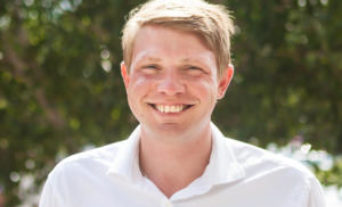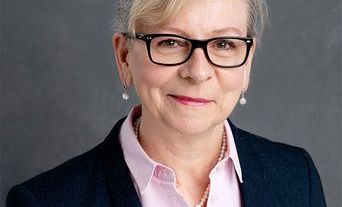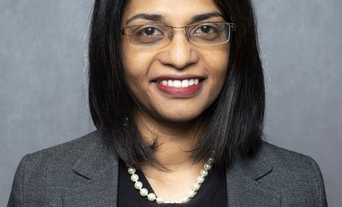Celebrating the work of pathologists for the College’s Diamond Jubilee
I was delighted to be invited to contribute to the Bulletin as the College celebrates its Diamond Jubilee. Since meeting Professor Mike Osborn, President of the Royal College of Pathologists, in March 2021 and being introduced to the College, I have been overwhelmed by the amazing work that pathologists and scientists do.
It’s been a privilege to be introduced to the many experts in pathology across the 17 specialties. I would like to take this opportunity to thank you for everything you have done and are doing to find a route out of this pandemic.
I know that College members worked tirelessly during the COVID-19 pandemic and the College has been supporting and providing guidance, during the rapid escalation of the situation, to the microbiology, virology, infection, blood sciences and immunology communities to manage viral and antibody testing. As we emerge from the pandemic, it is vital that services are reinforced and supported to optimise healthcare recovery both for COVID-19-related illness nd for the healthcare backlog. Pathologists are key to reducing the backlog, especially in cancer diagnosis.
Since meeting Professor Mike Osborn ... in March 2021 and being introduced to the College, I have been overwhelmed by the amazing work that pathologists and scientists do.
I have been in regular contact with the College throughout the pandemic to hear more about the fantastic work they are doing to support members at this difficult time, and what steps they feel the government could take that would be helpful in maximising our recovery.
Pathologists have also been at the forefront of transforming medical practice. One example is genomic medicine. Genomics provides an incredible opportunity for faster, accurate diagnosis and tailored treatment for people with cancer, and for better diagnosis for people with rare diseases. College members who have specific expertise and knowledge in this area are central to the successful implementation of genomic medicine across the NHS. However, this will require investment – with more staff equipped with knowledge, and laboratories with equipment.
As we emerge from the pandemic, it is vital that services are reinforced and supported to optimise healthcare recovery both for COVID-19-related illness and for the healthcare backlog.
Locally, The Royal Marsden in Sutton, which borders my constituency, is part of an ambitious initiative to sequence the genomes of thousands of people in England, to create a new Genomic Medicine Service for the NHS and transform the way people are cared for.
I know that the College is concerned that there is no planned resource provision for the significantly increased workload that the Genomic Medicine Service will create for pathology, which will grow over time. Without this being addressed there will be very significant issues in providing the quality and level of service desired and aspired to by the government. I wrote to the Secretary of State for Health and Social Care to raise this and other workforce-related and resource-related issues.
The £5.9 billion announced by the government at the Autumn Budget to help tackle the backlog of people waiting for diagnostic tests following the COVID-19 pandemic is welcome as is the extra money promised to the NHS from the new Health and Social Care Levy. However, we need to ensure that some of this new money is used for the vital increased investment in pathology services that the College has been highlighting for many years, particularly in the recruitment and training of pathologists and scientists.
In the Pathologists in Profile section, you can read some fascinating insights into how key figures arrived where they are today. Featured pathologists include Dr Suzy Lishman, past College President, consultant histopathologist and medical examiner, who explains how a chance meeting led to her becoming an elected officer of the College. Suzy highlights the importance of promoting pathology through an innovative and dynamic public engagement programme.
I know that the College is concerned that there is no planned resource provision for the significantly increased workload that the Genomic Medicine Service will create for pathology ... I wrote to the Secretary of State for Health and Social Care to raise this and other workforce-related and resource-related issues.
Immediate Past President, Professor Jo Martin, was National Clinical Director of Pathology for NHS England from 2013 to 2016 and President of the Royal College of Pathologists from 2017 to 2020. She has played a leading role in British pathology and has shown great commitment to expanding the pathology workforce and making learning accessible.
Dr Matt Clarke, Chair of the RCPath Trainees' Advisory Committee, tells us that he fell in love with pathology after a period as a histopathology trainee. He has since taken up posts with the Institute of Cancer Research and the University College London Hospitals, as well as supporting the College in a variety of committees and public engagement activities.
I am looking forward to continuing to work with the College to highlight the vital role pathologists and laboratory professionals play in healthcare as we respond to and recover from the pandemic.
Dr David Wells, Chief Executive of the Institute of Biomedical Science, started with a degree in Biomedical Science and, since 2018, has been recognised yearly as one of the 100 powerful advocates for pathology in the global community by the Pathologist magazine.
Professor Cheng-Hock Toh tells us about how he obtained a grant from the Roald Dahl Foundation to develop a walk-in centre for patients with haemophilia and thrombotic conditions so that their care would become less segmented and more integrated from a multidisciplinary, multispecialty team. The centre has constantly been creative in delivering patient-centred care. Its success has also enabled evolution into a hub-and-spoke model to improve patient choice in where care is best delivered.
Professor Kathreena Kurian describes neuropathology and a Cancer Research UK-funded project for early diagnosis of brain tumours. Professor Kurian tells us that a simple blood test performed by a GP in the clinic would aid decision-making and early diagnosis. This would revolutionise care by speeding up diagnosis, reducing costs and anxiety of unnecessary scans and reducing the number of patients presenting with inoperable large brain tumours.
Professor Sharon Peacock led the initiation and development of the COVID-19 Genomics UK Consortium (COG-UK). Professor Peacock started by convening a scientific group, who together developed bold plans for a nationwide sequencing network, supported by £14.5 million from the UK government COVID-19 fighting fund, administered by the Medical Research Council.
I am looking forward to continuing to work with the College to highlight the vital role pathologists and laboratory professionals play in healthcare as we respond to and recover from the pandemic. If you would like to contact me, please do email me on [email protected].




